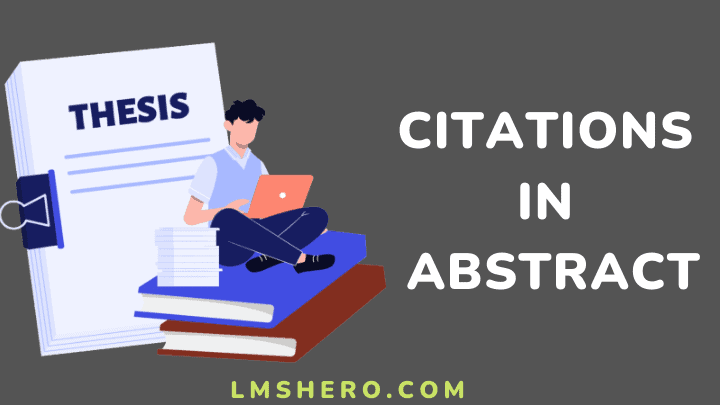Abstract citations are another controversial practice in writing research papers and dissertations. There are several ways to go about writing an abstract. But a pressing question is; should you have citations in an abstract?
Furthermore, references and citations play an important role in the body of academic writing and are your means to support the point you’re making with evidence.
When writing an academic paper, it’s important to know how to write good abstracts. In addition, it’s important to know when and where to cite the work of others, especially those who have come before you.
I’ll discuss what citations and abstracts mean and how they should be treated. Hopefully, by the end of this piece, you’ll know if citations in abstracts are is a good practice.
What is an abstract?
An abstract is a summary of your research paper or another type of writing. It usually contains background information, the problem, the methodology, and the results.
The purpose of an abstract is to provide readers with a concise understanding of what you will discuss in your paper or project.
An abstract should also include information about where you found your sources. The abstract does not provide an exhaustive description of the reported study.
Instead, it should provide enough information for readers to decide whether they want to take the time to read the full report. Keep in mind that an abstract focuses on your research alone.
What are citations and why are they important?
Citations are a way of acknowledging the work of others. When you use someone else’s work in your writing, you are citing them.
Citing sources helps to ensure that your ideas are based on reliable information. It can also help you track down any errors you might have made.
And finally, it shows your readers that you have done your research. Hence the major purpose of citations in academic work is to
- Cite your sources to support your claims
- Help others understand the research you’ve conducted
- Citations can improve the credibility of your work
- To reduce or avoid plagiarism
There are several ways to cite sources. However, the one you use may depend on the field in which you are writing and what your school or college recommends, among others.
Generally, you should use the following format when citing a source: author, year, the title of the article or book, and page number
Should you include citations in an abstract?
No, citations are not included in an abstract. This is because citations point to the literature used in a paper that is unnecessary for an abstract.
Moreover, the main purpose of an abstract is to summarize or give a summary of the work being presented.
Therefore, if any references were included, they would likely be unnecessary. Hence, it is difficult for readers to glean anything from the paper without reading it which defeats the purpose.
Besides, abstracts should be concise, so they don’t need citations or references. A research abstract describes the study in a brief, high-level manner so that people can understand the findings quickly.
How to format a good abstract

You don’t have to be a rocket scientist to write a good abstract. In fact, the key to a great abstract is simplicity. Here are a few tips to help you get started:
1. Keep your abstract short and detailed
Abstracts are important because they help readers understand your research in a few short paragraphs.
However, many abstracts are too generalized, and as a result, they’re difficult to read. To make your abstract easy to understand, keep it concise and detailed.
As a rule of thumb, abstracts should be less than 250 words. However, some journals, schools or fields may have desired word limits. Whatever the case may be, an abstract cannot exceed 300 to 500 words.
strict rule as regards the word count limit for an abstract. This is another reason why citations aren’t necessary for an abstract. Every word counts.
And be sure to include all the relevant information – no extra details or sentences that could be omitted without affecting the overall meaning of your paper.
2. Provide a clear statement about the purpose of the study and research methodology
When writing an abstract for a study, it is important to provide a clear statement about the purpose of the study and research methodology.
A research methodology is a process followed in conducting a study to answer a question. A research methodology typically includes what type of data is collected, how the data is analyzed, and how the data is published.
This will help readers understand the data and methods used in the study and whether they can be used to draw valid conclusions.
By providing this information upfront, researchers can avoid potential conflicts of interest and ensure that their data and conclusions are reliable.
3. Highlight your findings and recommendations for further research
Highlighting the findings and recommendations for further research are crucial tips for formatting a good abstract.
It is important to state the state results of the data analyzed and whether they correlate with a hypothesis (if applicable).
Readers should be able to get an understanding of what you did to understand why your findings are significant. This can also help readers understand any limitations that may have occurred in your study.
Additionally, make sure to include recommendations for further research so that readers can explore the topic in even more depth.
4. Present the main points in plain language
When writing your abstract, it’s important to take the time to present your key points in plain language.
This will make your abstract easier to read and understand, This will help your readers understand the general idea of your paper easily and make it easier for them to decide if they want to read further.
To achieve this, start by organizing your points into concise paragraphs. Each paragraph should focus on one specific point. Next, use clear wording and easy-to-understand terms to explain your points.
Finally, avoid jargon and overly technical language, and try to make your abstract accessible to a wide audience.
5. Proofread to ensure your information is accurate
Proofreading your abstract is an important step in formatting a good paper. By checking for grammar, spelling, and punctuation errors, you can ensure that your information is accurate and easy to read.
Errors can distract readers, causing them to lose focus on the rest of your paper. By taking the time to proofread your abstract, you can increase the chances that your paper will be well-received and achieve its intended goals.
FAQs
What is the most common mistake made with citations?
The most common mistake with citations is not citing your sources at all. This leads to serious plagiarism. Another mistake is wrong citations.
Are citations in abstracts considered a bad style?
Citations in abstracts are considered a bad style. This is because they can make the text confusing and difficult to read. They also take up more space and don’t provide much information to the reader.
What part of a thesis or article requires citations?
In the body of a thesis or research paper, citations support what has been written. They are necessary from the background of the research to the conclusion.
Final thoughts
Abstracts are one of the most important tools researchers have at their disposal – they can make or break a paper’s impact.
Citations in an abstract may seem like a necessary evil, some might feel like they should be included for the sake of scientific credibility.
However, citations in an abstract are not always necessary. As a researcher, you should focus on writing well and presenting the abstract excellently rather than worrying about whether you should include citations.
While there are different schools of thought and several tips to format an abstract, the tips listed serve as the basis of what you should keep in mind.
In case you’re still unsure how to conduct a survey or questionnaire, check out the article on the survey paper.
I wish you all the best in writing your next compelling abstract. Thanks for reading.







